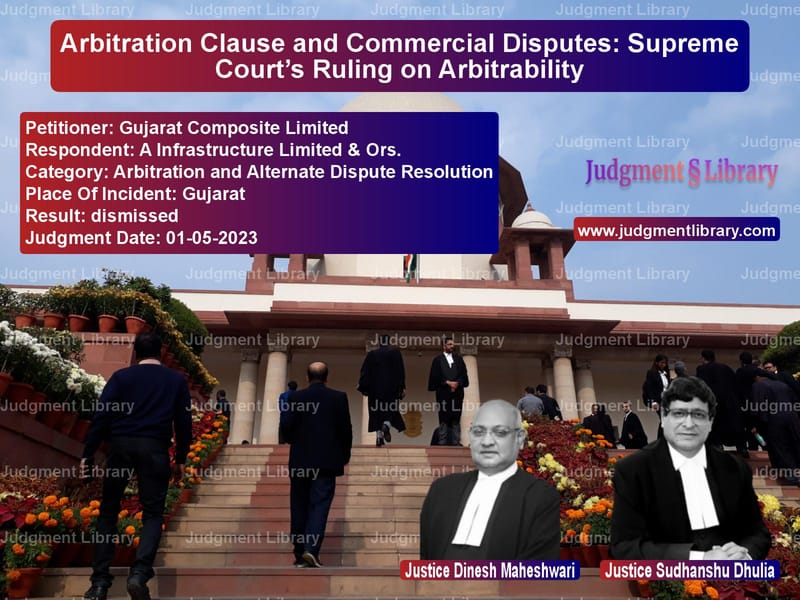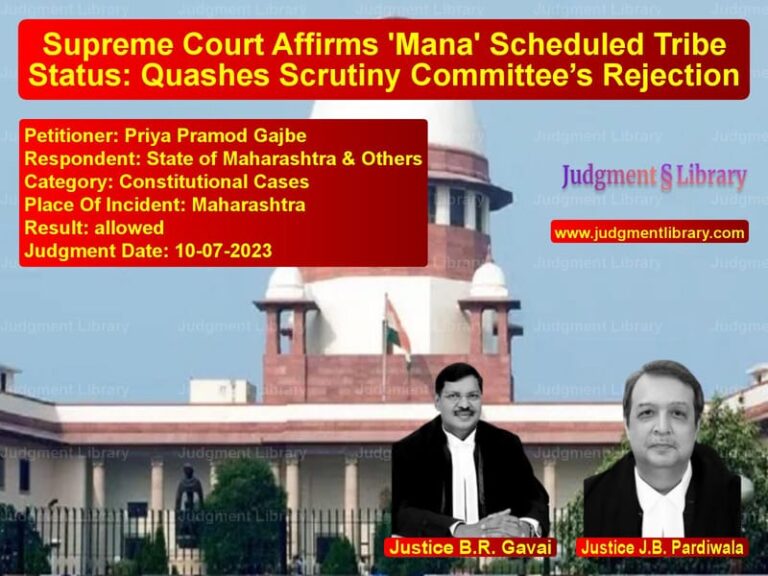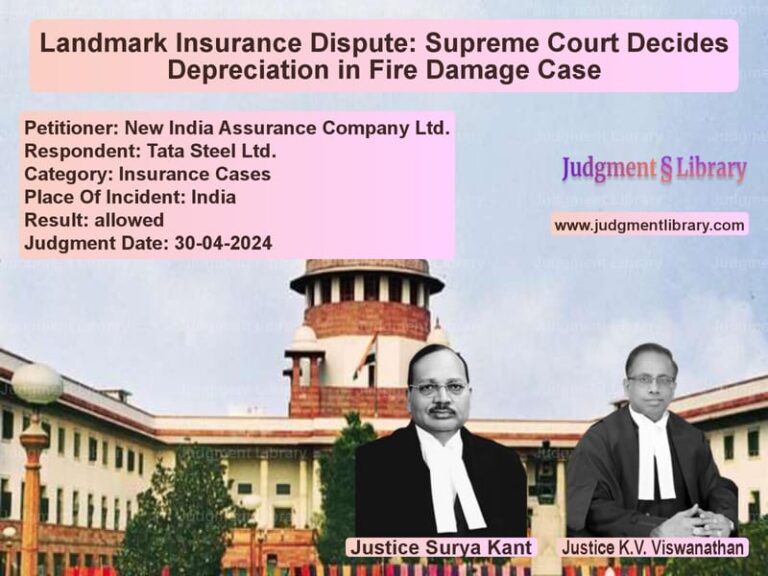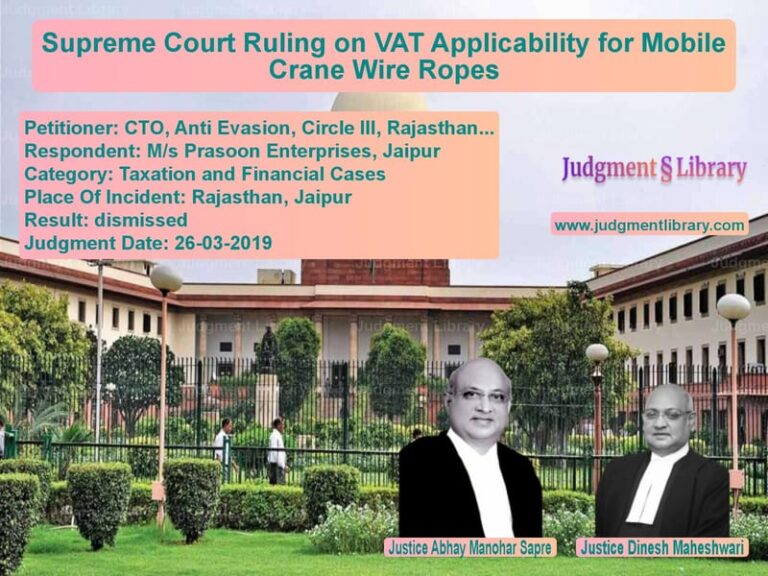Arbitration Clause and Commercial Disputes: Supreme Court’s Ruling on Arbitrability
The Supreme Court of India recently delivered a crucial ruling in the case of Gujarat Composite Limited vs. A Infrastructure Limited & Ors. regarding the arbitrability of disputes arising from multiple commercial agreements. The case centered on whether disputes involving multiple contracts and parties, some of whom were not signatories to the arbitration clause, could be referred to arbitration under the Arbitration and Conciliation Act, 1996.
Background of the Case
The dispute arose from a set of agreements executed between Gujarat Composite Limited (appellant) and A Infrastructure Limited (respondent), along with other parties, for licensing the operation of manufacturing units. The agreements included clauses related to licensing fees, financial assistance, and restrictions on the transfer of property.
The key agreements in question were:
- Licence Agreements (07.04.2005): Executed between the appellant and respondent, permitting the latter to operate manufacturing units.
- Supplementary Agreement (07.04.2005): Under which the respondent provided financial assistance to the appellant.
- Tripartite Agreement (06.07.2006): Executed between the appellant, respondent, and Bank of Baroda to secure financial obligations.
- Amendment to Tripartite Agreement (23.01.2008): Restricted the transfer of title deeds of the licensed property.
- Conveyance Deeds (23.01.2015): Executed between the appellant and third-party buyers, transferring ownership of certain manufacturing units.
Legal Dispute and Commercial Suit
Following the expiry of the licence agreement, disputes arose between the parties regarding financial claims, possession of manufacturing units, and transfer of property titles. The respondent filed a commercial suit against the appellant, seeking reliefs including:
- Recovery of Rs. 32.66 crores from the appellant.
- Declaration that the conveyance deeds executed in 2015 were null and void.
- Injunction restraining the appellant from interfering with the respondent’s possession.
- Directive to the bank not to release title deeds to the appellant.
In response, the appellant sought reference of the dispute to arbitration under Section 8 of the Arbitration and Conciliation Act, 1996, based on the arbitration clause contained in the licence agreement.
Arguments Before the Supreme Court
Petitioner’s Arguments
The appellant argued that:
- The arbitration clause in the licence agreement extended to all related agreements and disputes.
- The amended Section 8 of the Arbitration Act mandates referral to arbitration if a valid arbitration agreement exists.
- The dispute primarily arose from the licence agreement, making it arbitrable.
- The doctrine of “group of companies” should be applied to bind all parties to arbitration.
Respondent’s Arguments
The respondent countered that:
- The commercial suit involved multiple agreements, some of which did not contain arbitration clauses.
- The tripartite agreement with the bank was independent and lacked an arbitration clause.
- The dispute included non-signatories to the arbitration agreement, making bifurcation impractical.
- The reliefs sought went beyond the scope of the arbitration clause.
Supreme Court’s Observations
Existence of an Arbitration Agreement
The Court noted that while the licence agreement contained an arbitration clause, several other agreements, including the tripartite agreement, did not. The absence of an arbitration clause in crucial agreements indicated that the dispute could not be wholly resolved through arbitration.
Applicability of Section 8 of the Arbitration Act
The Court examined the amended Section 8, which mandates referral to arbitration unless the agreement is “prima facie non-existent or invalid.” It held that:
- The dispute involved parties who were not bound by the arbitration agreement.
- The claims for property rights and mortgage-related issues were non-arbitrable.
- Separating arbitrable and non-arbitrable claims would lead to conflicting rulings.
Doctrine of Group of Companies
The Court rejected the appellant’s reliance on the group of companies doctrine, ruling that mere commercial transactions between related parties do not automatically bind non-signatories to arbitration.
Final Judgment
The Supreme Court upheld the decisions of the Commercial Court and the High Court, ruling that:
- The dispute was not wholly arbitrable due to the involvement of non-signatories.
- The presence of non-arbitrable claims prevented referral to arbitration.
- The commercial suit would proceed in the civil court.
Key Takeaways
- Arbitration Agreement Scope: Courts will not extend arbitration clauses to agreements that do not explicitly include them.
- Non-Arbitrable Claims: Disputes involving property rights and mortgage transactions remain within civil court jurisdiction.
- Multiple Agreements: When a dispute involves several contracts with different dispute resolution mechanisms, arbitration may not be the preferred route.
- Doctrine of Group of Companies: Non-signatories cannot be compelled to arbitrate unless a clear intent to be bound is demonstrated.
- Judicial Discretion: Courts retain discretion to determine whether arbitration is appropriate based on the nature of the dispute.
Conclusion
This ruling provides critical clarity on the limitations of arbitration in commercial disputes involving multiple agreements and parties. It reinforces that arbitration cannot be imposed on non-signatories and that courts retain the authority to adjudicate matters that fall outside the scope of an arbitration agreement.
Petitioner Name: Gujarat Composite Limited.Respondent Name: A Infrastructure Limited & Ors..Judgment By: Justice Dinesh Maheshwari, Justice Sudhanshu Dhulia.Place Of Incident: Gujarat.Judgment Date: 01-05-2023.
Don’t miss out on the full details! Download the complete judgment in PDF format below and gain valuable insights instantly!
Download Judgment: gujarat-composite-li-vs-a-infrastructure-lim-supreme-court-of-india-judgment-dated-01-05-2023.pdf
Directly Download Judgment: Directly download this Judgment
See all petitions in Arbitration Awards
See all petitions in Dispute Resolution Mechanisms
See all petitions in Arbitration Act
See all petitions in Commercial Arbitration
See all petitions in Enforcement of Awards
See all petitions in Judgment by Dinesh Maheshwari
See all petitions in Judgment by Sudhanshu Dhulia
See all petitions in dismissed
See all petitions in supreme court of India judgments May 2023
See all petitions in 2023 judgments
See all posts in Arbitration and Alternate Dispute Resolution Category
See all allowed petitions in Arbitration and Alternate Dispute Resolution Category
See all Dismissed petitions in Arbitration and Alternate Dispute Resolution Category
See all partially allowed petitions in Arbitration and Alternate Dispute Resolution Category







